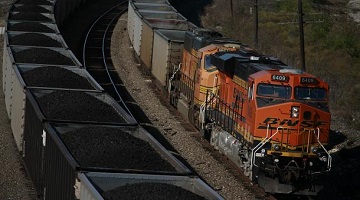Railroad to make shift to natural gas locomotives
 The freight railroad company BNSF made a big announcement today. It’s going to do a little experiment and switch from diesel to natural gas to power its locomotives. BNSF happens to be owned by Warren Buffett’s Berkshire Hathaway. Buffett is betting big on natural gas. If this latest natural gas play works, it could mean big profits and big changes for the entire rail industry.
The freight railroad company BNSF made a big announcement today. It’s going to do a little experiment and switch from diesel to natural gas to power its locomotives. BNSF happens to be owned by Warren Buffett’s Berkshire Hathaway. Buffett is betting big on natural gas. If this latest natural gas play works, it could mean big profits and big changes for the entire rail industry.BNSF considered using natural gas in its locomotives back in the ’80s, but there is a big difference between then and now. Natural gas is way cheaper than the diesel today.
“Something has to take advantage of that economic arbitrage,” says energy analyst David Bellman. He points out that BNSF is doing exactly that – taking advantage of the low-cost of natural gas.
But the transition won’t be simple. Locomotives will have to be redesigned, and they will need more fuel storage and new fueling stations. All that infrastructure is going to be expensive. But according to energy expert Amy Jaffe, it’s worth it for Buffett and Berkshire Hathaway.
Even with the cost of converting vehicles, Jaffe says, “You can make money almost overnight.”
Once the conversion is complete, BNSF trains will have to refuel less often than diesel trains, they will be cheaper to run and they will pollute less. Jaffe expects more railroads to make the switch.
That could put the entire railroad industry on a new track. Companies like GE and Caterpillar, which are designing the new liquid natural gas locomotives, would benefit from the conversion. Those benefits could spread to gas suppliers.
“You have some very big players” says Jaffe. “Shell has entered this market, BP is looking at this market, Conoco Phillips.”
Of course, all that demand for natural gas will make the price go up and reduce some of its advantage over diesel. But most analysts expect natural gas to stay below the cost of diesel for quite a while. And a rise in demand coupled with a little price increse probably wouldn’t bother Warren Buffett, who has invested billions in natural gas.
In the end, he could make out like a train bandit.
You can return to the main Market News page, or press the Back button on your browser.

